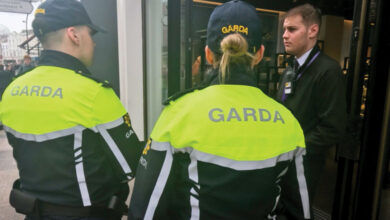Government commitments on justice

As the State grapples with an understaffed Garda, an overloaded judiciary, and an epidemic of gender-based violence, eolas Magazine outlines the Government’s key priorities as laid out in the 2025 Programme for Government.
Published in January 2025, the Programme for Government contains 119 commitments on justice. Priorities include increased resourcing for An Garda Síochána, modernising the courts and legal system, and tackling violence against women and girls.
Under the banner of “safe and secure commitments”, the framework says the Government is “committed to building stronger, safer communities”.
Garda recruitment
To address a shortage of officers, the PfG commits the Government to provide funding for 5,000 new garda recruits by 2030.
As of August 2025, there are 14,369 active gardaí across the State, alongside 3,494 civilian staff and 296 reservists. The figure of 14,369 is a decrease of 188 from the 2009 figure of 14,547. If garda recruitment had held pace with population growth, there would have been 17,623 gardaí.
To improve the attractiveness of a garda career, the PfG says the Government will “consider allowing garda trainees to undergo part of their training in… universities or technological universities” while also increasing the trainee allowance, while also “examining the introduction of an accelerated graduate entry programme”.
To facilitate the anticipated rapid rise in recruitment, the PfG reiterates support for the expansion of Templemore Garda Training College in County Tipperary, alongside a pledge to “consider” the establishment of a second training college.
In August 2025, The Irish Times reported that Minister for Justice, Home Affairs and Migration Jim O’Callaghan TD was warned by the Policing Authority that “in the absence of radical and meaningful reform… it is highly unlikely the target of at least 5,000 gardaí… will be met”.
Enforcement
The number of automatic number plate recognition (ANPR) cameras is set to increase and, partially in response to the 2023 Dublin riots, facial recognition cameras (FRT) will be legislated for. The Irish Council for Civil Liberties have branded FRT “highly intrusive and invasive technology that is faulty, unreliable and discriminatory”.
To protect gardaí, there will be investment in extra equipment and technology, including body armour, additional vehicles, and water cannons.
Alongside this, all gardaí will be equipped with body-worn cameras. Gardaí will also receive guidance on the use of artificial intelligence in criminal investigations.
As crime continues to proliferate online, gardaí will be given the authority to “request” passwords for electronic devices when executing a search warrant, and the National Cyber Crime Bureau will receive an increase in funding.
Modernising courts legal systems
To address understaffing, the PfG commits the Government to appointing 20 additional judges within 12 months, alongside establishing a judicial training institute to “support ongoing training and continuous professional development for judges”. They are expected to be appointed in 2026.
The Government is also committed to a review of the criminal justice system within 12 months, with publication expected in Q1 2026.
Currently, sentencing guidelines are standardised across the State, the PfG contains a commitment to “draw up sentencing guidelines for a particular crime area”. The Government also commits to “[developing] new guidelines to set clear rates of scales of fees for all forms of civil litigation”.
In 2023, the European Commission introduced an “e-evidence package”, simplifying the process of police and judicial authorities obtaining electronic evidence in criminal investigations. The PfG commits the Government to “prioritising implementation of the e-evidence package”, including the creation of a new standalone agency.
To improve the efficiency of the administration of justice, the framework commits the Government to “designing and implementing a modern courts infrastructure”.
Tackling crime
The PfG contains a commitment to the publication of a Rural Safety Strategy, published in September 2025, and an action plan to tackle corruption and economic crime.
In recent years, a spate of protests outside the homes of TDs and councillors, most notably that of then-Taoiseach Simon Harris TD have occurred. In response to this, the Government have committed to “asking the Joint Oireachtas [on Justice, Home Affairs and Migration] to consider a ban on protests outside private homes”.
A commitment to banning the wearing of face coverings at protests was watered down in May 2025, as the Criminal Law and Civil Law (Miscellaneous Provisions) Bill 2025 stopped short of an outright ban on the wearing of face coverings at protests. Instead, gardaí will have the power to require an individual to remove a face covering, subject to criteria.
While stopping short of outright decriminalisation. the Government have also reiterated its commitment to pursuing a “health-led” approach to drug addiction, diverting those found in possession of drugs for personal use to health services. Simultaneously, sentences for those involved in the supply of narcotics will be reviewed to “ensure the punishment… reflects the destruction and devastation those drugs impose on our communities”.
Gender-based violence
Since 1996, 275 women have been murdered across the State, 63 per cent in their own homes. According to the 2024 EU gender-based violence survey, 35 per cent of Irish women have experienced psychological, physical and/or sexual abuse from an intimate partner, with 25 per cent of women experiencing sexual violence as an adult with a partner; a staggering estimate of over 660,000 people.
To fight this epidemic, the PfG commits the Government to introducing a Zero Tolerance Plan [on gender-based violence] for 2026-2030 alongside delivering 280 refuge spaces by 2026.
Stronger laws against ‘spiking’ were introduced to the Dáil in May 2025, alongside the criminalisation of ‘sex for rent’, as promised in the PfG.
The framework also commits the Government to reviewing maximum sentences to those convicted of child sexual abuse, and examining proposals to remove guardianship rights from those convicted of killing their partners.





